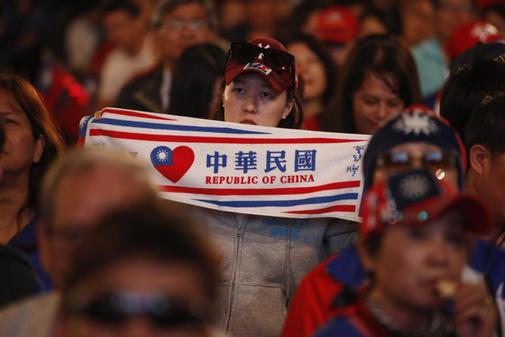- Asia.Elections in Taiwan: between Hong Kong, China and the fake news
- Asia.Tuvalu, the island that was not allowed to buy for China in its encirclement to Taiwan
In the background, Beijing's big eyes watched intently. At stake were much more than just choices. On the electoral board there were two options: stay away from the tentacles of China or reach out - and, perhaps, the territory - to the neighbors above. And Taiwan has chosen the first.
Early in the morning, on the blue running track of the Fuxig Elementary School in Luoyan Street, a polling station in downtown Taipei, Sophia walks by pushing the wheelchair in which her grandfather Li Tengchi sits. Both have just voted. "We want to maintain freedom and democracy. And there is only one party that guarantees that this will continue like this," explains Sophia. "My vote has gone to Tsai Ing-wen. She is going to win clearly because we don't want the Chinese to come here," Li replies.
The grandfather was right. Tsai Ing-wen (63 years old), leader of the Progressive Democratic Party (PDP), the president of Taiwan for the past four years, has revalidated her position. He played well the letter of fear to China throughout the election campaign . She, the woman who defines herself as a defender of Taiwan's liberal values against "the increasingly authoritarian shadow cast by Beijing under the presidency of Xi Jinping," has won her main rival, politician Han Kuo, forcefully at the polls -yu (62 years old), of the Chinese nationalist party, the conservative Kuomintang (KMT). Han, mayor of Kaohsiung City, was seen by Beijing as the best option to regain ties with the island.
With more than 95% of the scrutiny, Tsai Ing-wen has won with 57.7% (more than seven million votes), while Han Kuo-yu has remained at 38.3% (more than four million and medium). The president has risen more than one point compared to the 2016 elections, in which the legislative majority was secured with 56.1% of the votes.
From Beijing, they would have preferred, in front of what they consider one of their "wayward children" to another kinder candidate towards their idea of reunification in the not too distant future. But President Tsai has always made it clear. The first time, four years ago: "I will be the defender of Taiwan's liberal values against the increasingly authoritarian shadow cast by Beijing under the presidency of Xi Jinping." Last time, in his last speech the night before the election: "Let's vote for a leader who guides Taiwan through the international community, not a candidate who wants to lock us up as another part of China." And continued before a crowd that jelly like heroin. "This is a vote for Taiwanese to decide on democracy and freedom, challenging the constant threat of annexation from China . "
Tsai has demonstrated that firmness by surviving - politically - the international diplomatic isolation promoted by China. Also to the threats of the Chinese president, Xi Jinping, who a year ago assured that "unification of Taiwan was inevitable" and that "Beijing reserved the right to use military force to achieve it."
Those threats and their strong opposition to China's control were precisely those that led Tsai to trace back in the polls. Until then, his popularity had fallen in favor of the opposition's leading politician. Many Taiwanese did not like the pension reform of President Tsai or the labor law of flexible schedules that caused great chaos in small businesses. Nor, in the most conservative sectors, did he convince that, under his mandate, Taiwan became the first country in Asia to legalize gay marriage. Instead, these social measures won the favor of the younger electorate.
In addition, the outbreak of protests in Hong Kong protests, showed more and more citizens of the island that the formula "one country, two systems" that the Chinese president wants to impose on Taiwan has not even worked in the former colony British "Hong Kong is on the verge of chaos due to the failure of 'one country, two systems'. There is an overwhelming consensus among the 23 million inhabitants of Taiwan. We all reject the formula that China wants to impose," the president repeated every time You have been asked about this matter. A position that has been gaining adherents in the last months of the campaign until it was re-emerging as president of Taiwan.
According to the criteria of The Trust Project
Know more- China
- Xi Jinping
- Taiwan
- Hong Kong
- Asia
AsiaTuvalu, the island that was not allowed to buy for China in its encirclement to Taiwan
Tal Día como HoyMacao, the end of the Portuguese Empire
The portrait Chen Quanguo, Xi Jinping's hard arm

